Meet our awardees
TSP in collaboration with PMU-C, is supporting six projects in Thailand with ODA funding under the UK government’s new International Science Partnership Fund.
Grant recipients have been awarded up to £50,000 for one year research collaboration and knowledge sharing projects between Thailand and the UK.
Novel micro-monolith reactor for efficient conversion of waste CH4 and CO2 into valuable chemicals using renewable electricity
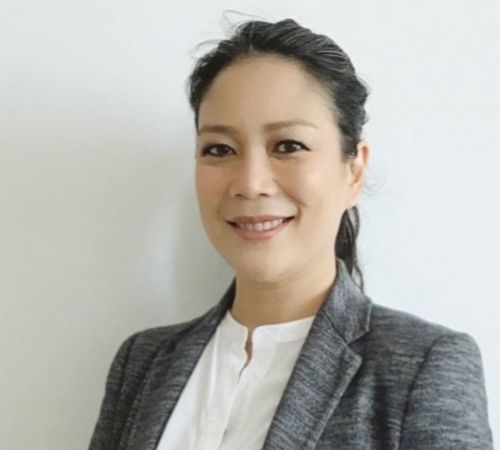
Unalome Wetwatana Hartley | King Mongkut's University of Technology
UK Project lead:
- Prof Kang Li | Imperial College London
Industry partner:
- SCG (Siam Cement Group)
Biogas Empowerment: Accelerating Community Grids and Collaborative Networks in Thailand (BEACON)
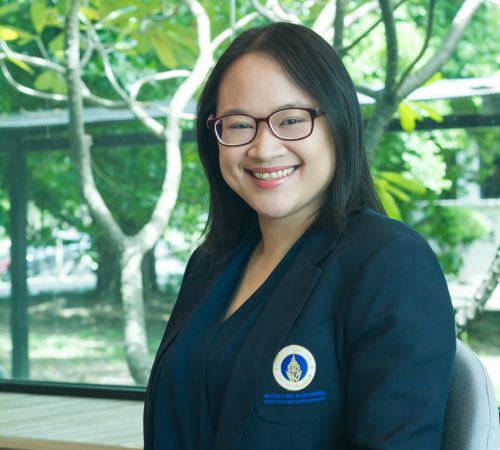
Dr Trakarn Prapaspongsa | Mahidol University
UK Project lead:
-
Dr Davide Poggio | University of Sheffield
Industry partner:
- Pattanasiri Engineering Limited Partnership
The BEACON project, a collaboration between Thailand and the UK, aims to enhance biogas production and utilisation in Thailand through several key strategies. It focuses on optimising biogas yields by assessing ideal feedstock combinations, analysing the feasibility of community biogas grids, and promoting stakeholder engagement and knowledge transfer. Organised into four work packages, the project encompasses engineering research, feasibility studies, industry collaboration, and skill development. Key outputs include the development of tools for biogas yield optimisation and community grid development, as well as educational programmes to enhance industry skills and knowledge. Through joint efforts, UK and Thai partners aim to address biogas challenges effectively, providing practical solutions and laying the groundwork for future energy collaborations between the two nations.
Measurement of residual stresses and porosity studies on corrosion resistance of protective coatings for offshore wind turbine foundations using thermal spray technology
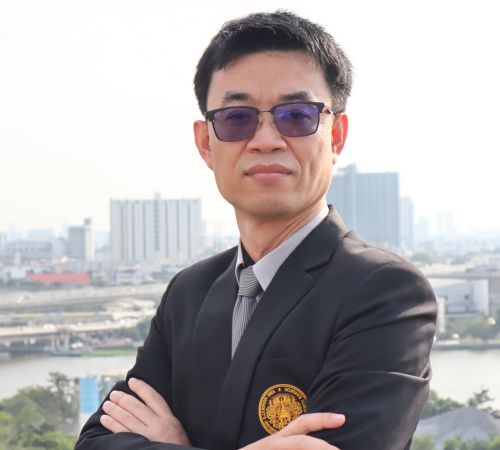
Dr Peerawatt Nunthavarawong | King Mongkut's University of Technology
UK Project lead:
- Professor Michael Fitzpatrick | Coventry University
Industry partner:
- Advance Surface Technology Co. Ltd
The project aims to evaluate how thermal spray coatings function as a preventative measure for onshore and offshore wind turbine foundations, known as monopiles. It covers various topics such as residual stress measurement, the impact of coating porosity on corrosion, and simulations of corrosion resistance. Synchrotron X-ray Diffraction (S-XRD) will assess residual stresses resulting from mechanical processes and microstructural phase changes. The proposal outlines a comprehensive study combining sophisticated simulation methods with laboratory experiments, focusing on their ability to tolerate residual stresses, thwart corrosion, and address porosity issues. Results could have significant applications, potentially enhancing reliability and affordability in the offshore wind energy industry. This research contributes to ongoing initiatives for sustainable harnessing of renewable energy sources, meeting global energy demands while mitigating the effects of climate change.
Fabrication of nanosilver doped activated carbon into high-efficiency car air filter
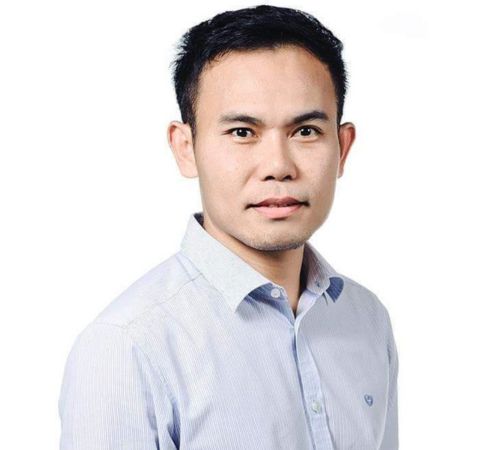
Dr Pongtanawat Khemthong |
National Nanotechnology Center, National Science and Technology Development Agency
UK Project lead:
- Professor Gopinathan Sankar | UCL
Industry partner:
- Brainstorm Engineering & Research Co.,Ltd
The project's current achievements include the successful development of a green, sustainable, and scalable production process for silver-doped activated carbon (Ag/AC), operating at a 150-litre initial feed capacity, corresponding to a TRL-6. The resulting Ag/AC material serves as a highly effective adsorbent, proficiently eliminating gases and demonstrating remarkable efficacy in inhibiting bacteria and viruses. Therefore, this project is committed to broadening the applicability of Ag/AC by pioneering accessible technology to produce carbon air filters, with a particular focus on upscaling production (TRL-6 to higher levels). Additionally, we intend to conduct field tests to evaluate their performance in public transportation.
The manufacturing process is grounded in the principles of pleated mechanical air filter techniques. The layered air filter design encompasses Ag/AC as the core adsorbent media, complemented by an outer filter sheet made of HEPA spun-bonded nonwoven material. As a culminating step, these materials will be fashioned into pleated filters for deployment in cabin cars, vans, and air purification devices. Building upon the insights gained from our pilot-scale air filter production study (TRL-6), we have observed that this type of filter demonstrates remarkable efficacy in filtering PM2.5 particulate matter, odours, smoke, and volatile organic compounds, and preventing the adhesion of pathogens and viruses to its surface.
Development and Implementation of Waste-Filled Portable Crash Boxes for Crashworthiness Performance Improvement of Road Service Vehicles
Sompong Srimanosaowapak | National Metal and Materials Technology Center
UK Project lead:
- Dr Hessam Ghasemnejad | Cranfield University
Industry partners:
- Bangkok Expressway
- Metro Public Company Limited
Other partner:
- University of West Bohemia
This project aims to achieve three main objectives:
- Designing two waste-filled portable crash boxes for road service vehicles, implementing them on at least three vehicles from different owners, and disseminating knowledge on sustainable-designed crash boxes to the public.
- Activities include redesigning crash boxes using waste-filled beverage cans and honeycomb structures, installing them on road service vehicles, and disseminating results through various channels.
- Main outputs include designing two new waste-filled portable crash boxes, equipping at least three road service vehicles with them, and disseminating project results. The implementation of these crash boxes will enhance road safety, with potential for future continuation through CSR campaigns and student-led fabrication for free distribution to vehicle owners.
Affordable hearing for all: Mobile remote AI software to access hearing and predict cognitive decline among older adults
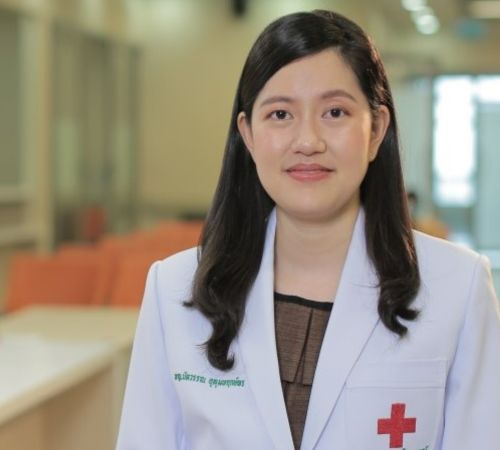
Dr Nattawan Utoomprurkporn | Chulalongkorn University
UK Project lead:
- Professor Doris Bamiou | UCL
Industry partner:
- Eartone(Thailand)Co;Ltd
This research project focuses on further developing advanced software and mobile applications for self-hearing checks by collaborating with Eartone (Thailand) Co., Ltd. The aim is to enable users to conveniently conduct hearing tests at home using Android and iPhone devices. Building upon the success of previous funding in 2021, the project has three primary objectives:
- Testing the AI technology embedded within the app for self-hearing checks, comparing its efficacy against traditional tests administered by medical professionals.
- Investigating the acceptability of older individuals in Thailand regarding the use of the app for self-hearing checks. Community acceptance plays a pivotal role in fostering widespread application adoption.
- Analysing key predictors of hearing ability among older Thai adults by leveraging data collected from the mobile application to identify optimal testing conditions.
The app is designed to be user-friendly, enabling anyone to conduct a screening hearing test on themselves. The project intends to promote the app through workshops aimed at encouraging individuals to monitor their hearing health. Additionally, there are plans to make the app available in multiple languages and expand its usage to other countries, including the UK and Southeast Asian nations.
